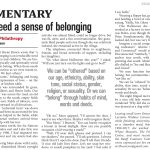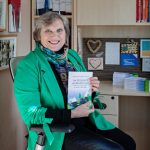Navigating Grey – as published in Rocky Mountain Outlook, September 5, 2019
On the same day that Greta Thunberg stepped on a high-tech sailing vessel in Plymouth England, I entered a bookstore in Fernie where I had picked up a copy of “No One is too Small to Make a Difference”. The title caught my eye because ‘making a difference’ aligns with my definition of community philanthropy.
“Have you heard about this author?” I asked the clerk while handing her my money. “She’s a sixteen-year old climate activist from Sweden.”
“She also has Asperger’s,” I continued, “and says that her diagnosis is her super-power. Asperger’s helps her see everything in black and white.”
Thunberg’s book includes eleven essays, speeches and social media posts written between September 8, 2018 and April 23, 2019. In fewer than 10,000 words, the young Swede argues in plain English that climate change is real and asks everyone to panic as if the house is on fire. Her essays have titles such as: Unpopular. Prove Me Wrong. Together we are Making a Difference.
In the chapter I’m too Young to Do This, she makes reference to her thought patterns.
“Some people mock me for my diagnosis,” wrote Thunberg. “But Asperger’s is not a disease, it’s a gift. People also say that since I have Asperger’s I couldn’t possibly have put myself in this position. But that’s exactly why I did this, because if I would have been normal and social, I would have organized myself in an organization or started an organization by myself.
“But since I am not that good at socializing, I did this instead.”
“This” being a one-person climate strike. On a Friday in August 2018 she acted with black and white clarity and refused to go to school. Since then, Friday climate strikes have been taking place around the world and Greta has launched a global movement known as Fridays For Future. On September 23, she will speak at The UN Climate Summit defending the statement: Climate change is the defining issue of our time and now is the defining moment to do something about it.
In October 1973, I was 17 years old and driving myself to school. The Iranian Oil Crisis was the topic on the radio talk show. I heard the words oil embargo for the very first time. As clearly as I remember the words to Roberta Flack’s Killing me Softly, I remember looking at my speedometer and slowing down to 55 mph.
That morning I heard speakers connect geo-politics to consumer choice and social responsibility. Soon the provincial government had posted new signs on the highway to lower the speed limit, and my new habit was to leave the house five minutes earlier.
The next year, I enrolled in Biology at Queen’s University. In my third year Oceanography course, I researched the tides in the Bay of Fundy and was excited by this powerful source of potential energy.
Forty-five years later, Nova Scotia government has revoked a company’s license to operate in the Bay and ordered it to remove a massive tidal turbine. Three months later, an Alberta company was given permission to test its green technology in an ongoing quest to harness Fundy’s power in sustainable, cost-effective and environmentally responsible ways.
Black. White. Grey. Gray. No matter how you spell it, or how you think, a sixteen-year old has sailed across the Atlantic in a high-tech boat that did not use fossil fuels or emit greenhouse gases. Ironically, this socially uncomfortable teenager who doesn’t like organizing others is insisting that we think differently and organize ourselves in ways that believe the scientists as we make changes that will benefit future generations.
To me, that sounds like philanthropy when defined as ‘practical kindness that works to actively help humanity’.





